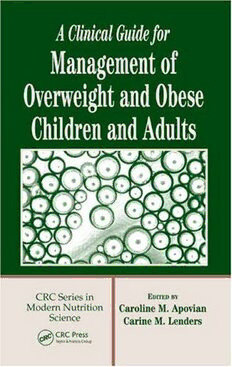
A Clinical Guide for Management of Overweight and Obese Children and Adults (Crc Series in Modern Nutrition Science) PDF
328 Pages·2006·4.606 MB·English
Most books are stored in the elastic cloud where traffic is expensive. For this reason, we have a limit on daily download.
Preview A Clinical Guide for Management of Overweight and Obese Children and Adults (Crc Series in Modern Nutrition Science)
Description:
While unhealthy diet and sedentary behaviors are second only to smoking as the leading preventable cause of death in the U.S., less than 45 percent of adult and pediatric obese patients received any prior advice from a physician to lose weight. The low rate of identification and treatment of obesity by physicians can often be attributed to lack of awareness, lack of counseling skills, and the high rate of recidivism in overweight patients. A Clinical Guide for Management of Overweight and Obese Children and Adults addresses deficiencies in the identification, treatment, and management of obesity through a collection of monographs written by internationally recognized authorities. Designed for healthcare practitioners, this reference provides practical distinctions and recomendations for adult and pediatric obesity in a single volume. This clinical guide outlines the management of the obese patient from the preparation of office accommodations through the long road of maintained wellness. The editors offer evaluation and assessment strategies for the simply overweight patient to severe complex obesity with multiple comorbidities. It considers treatment modalities from lifestyle change to bariatric surgery, including exercise, diet, and pharmacotherapeutic remedies. The book highlights weight management through behavioral health considerations, the community support system, and other adjunctive therapies, as part of a comprehensive weight loss program. Taking in to consideration the holistic methods incorporated in the new discipline of obesity medicine, A Clinical Guide for Management of Overweight and Obese Children and Adults reviews the state-of-the-art management of this burgeoning “disease” epidemic.
See more
The list of books you might like
Most books are stored in the elastic cloud where traffic is expensive. For this reason, we have a limit on daily download.
